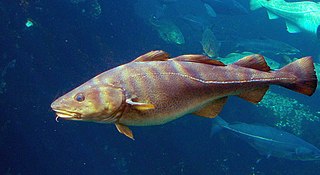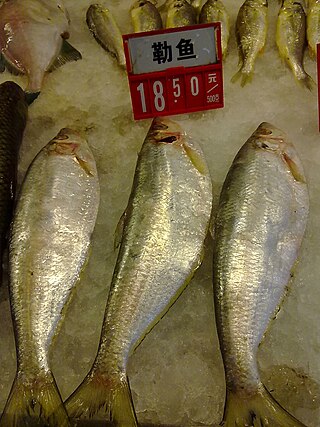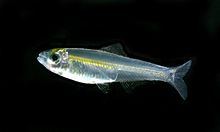
Cod is the common name for the demersal fish genus Gadus, belonging to the family Gadidae. Cod is also used as part of the common name for a number of other fish species, and one species that belongs to genus Gadus is commonly not called cod.

Clupeiformes is the order of ray-finned fish that includes the herring family, Clupeidae, and the anchovy family, Engraulidae. The group includes many of the most important forage and food fish.

Herring are various species of forage fish, mostly belonging to the family of Clupeidae.

Sprat is the common name applied to a group of forage fish belonging to the genus Sprattus in the family Clupeidae. The term also is applied to a number of other small sprat-like forage fish. Like most forage fishes, sprats are highly active, small, oily fish. They travel in large schools with other fish and swim continuously throughout the day.

The European sprat, also known as brisling, brisling sardine, bristling, garvie, garvock, Russian sardine, russlet, skipper or whitebait, is a species of small marine fish in the herring family Clupeidae. Found in European, West Asian and North African waters, it has silver grey scales and white-grey flesh. Specific seas in which the species occurs include the Irish Sea, Black Sea, Baltic Sea and Sea of the Hebrides. The fish is the subject of fisheries, particularly in Scandinavia, and is made into fish meal, as well as being used for human consumption. When used for food it can be canned, salted, breaded, fried, boiled, grilled, baked, deep fried, marinated, broiled, and smoked.

The Australian sprat is a sprat fish whose habitat ranges in the waters surrounding Australia including Tasmania. It is a pelagic fish which is found in anti-tropical, temperate water. It is a part of the Clupeidae family. Other members of the Cluepeidae family also include herring, menhaden, sardines as well as shads. It is currently a relative unknown species of Sprat compared to the other members of the family. In total, there are five different types of True Sprats. What makes Australian Sprats different from the rest is their location and appearance. Sprattus Novaehollandiae have a dark blue back and a protruding lower jaw. They are found in the Southern regions of Australian such as lower Victoria and Tasmania were there are colder climates. On average, Australian Sprat grown up to 14 cm and live in the range of 0–50 meters deep in the ocean. They will lay between 10,000 and 40,000 eggs per year and live for approximately 5–7 years. Other names for the Australian Sprat include Clupea Bassensis and Meletta Novaehollandiae.

The New Zealand blueback sprat is a herring-like, forage fish of the family Clupeidae found in the waters around New Zealand, between latitudes 37° S and 48° S, and longitude 166° E and 180° E, to depths of up to 50 m. It belongs to the genus Sprattus, a small oily fish usually known by their common name, sprats. Its length is up to 12 cm.

The New Zealand sprat is a herring-like, marine fish in the family Clupeidae found in the subtropical southwest Pacific Ocean endemic to New Zealand. It belongs to a genus Sprattus of small oily fish, usually known by their common name, sprats.

Clupeoides is a genus of sprats that occur in rivers in Southeast Asia. There are currently four recognized species in the genus.

Clupeonella is a genus of fish in the family Ehiravidae. They are widespread in the fresh and brackish waters of the Caspian Sea and Black drainages.

Zacco is a genus of small ray-finned fishes in the family Cyprinidae. They are found in freshwater habitats in China and northern Vietnam. The generic name Zacco derives from the Japanese Zako雑魚.

Ilisha is a genus of ray-finned fishes in the family Pristigasteridae. The genus contains 16 species. It is similar to Pellona but lacks a toothed hypo-maxilla. The genus has a worldwide distribution in tropical and subtropical coastal waters and estuaries. Some species also enter rivers, and I. amazonica and I. novacula are largely–if not entirely–restricted to tropical rivers.

Corica is a small genus of sprats that occur in rivers in South Asia and Southeast Asia. Two described species are placed in the genus.

Ehirava fluviatilis, or the Malabar sprat, is a species of fish endemic to the rivers and coastal lagoons and estuaries of southern India and Sri Lanka. It is the only recognized species in the genus Ehirava. It grows to 5 cm (2.0 in) standard length.
Nannothrissa is a genus of very small fish in the herring family, Dorosomatidae, endemic to the Congo River system in Africa. There are currently only two recognized species
Platanichthys platana, the Rio Plata sprat, is a very small species of fish belonging to the family, Dorosomatidae. It is endemic to South America. It is the only species in its genus.
Ramnogaster is a small genus of sprats found only in South America. Two species are placed in this genus:

Rhinosardinia is a small genus of sprats restricted to the rivers of South America. There are currently only two described species in the genus.

The Alosidae, or the shads, are a family of clupeiform fishes. The family currently comprises four genera worldwide, and about 32 species.

Microthrissa royauxi, the royal sprat, is a species of pelagic, freshwater fish from the herring family Clupeidae which is found in the Congo River basin in west Africa. It was described in 1902 by the Belgian-British zoologist George Albert Boulenger. It is of limited importance as a food fish in subsistence fisheries and its conservation status is Least Concern.
















